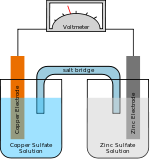Lithium–titanate battery
The lithium–titanate battery is a type of rechargeable battery, which has the advantage of being faster to charge than other lithium-ion batteries. Titanate batteries are used in Mitsubishi's i-MiEV[1] electric vehicle and Honda uses them in its EV-neo electric bike and Fit EV.[2][3] Opportunity charging in public transportation, such as large capacity electric bus project TOSA, is using the Titanate batteries high charging capability to partly recharge the battery in 15 seconds while passengers are disembarking and embarking at bus stops[4]
A lithium–titanate battery is a modified lithium-ion battery that uses lithium-titanate nanocrystals on the surface of its anode instead of carbon. This gives the anode a surface area of about 100 square meters per gram, compared with 3 square meters per gram for carbon, allowing electrons to enter and leave the anode quickly. This makes fast recharging possible and provides high currents when needed.[5]
A disadvantage of lithium-titanate batteries is that they have a lower inherent voltage (2.4 V), which leads to a lower energy density of about 30-110Wh/kg[6] than conventional lithium-ion battery technologies (which have an inherent voltage of 3.7 V).[7]
Contents
Brands and uses
Altairnano
Altairnano produce lithium–titanate batteries under the "Nanosafe" line, mainly for battery electric vehicles. Some vehicle manufacturers which announced plans to use Altairnano batteries includes Lightning Car Company, which plan to use them for Lightning GT, an all-electric sports car,[8][9] Phoenix Motorcars, in its electric sport-utility vehicles,[10] and Proterra, in its all-electric EcoRide BE35 vehicle, a lightweight 35-foot bus.[11]
Altairnano has also deployed their lithium–titanate energy storage systems for electric grid ancillary services[12] and in various military applications.[13]
Leclanché
Leclanché is a Swiss battery manufacturer, founded in 1909. In 2006 acquisition of Bullith AG (Germany) to establish a Li-Ion manufacturing line in Germany. In 2014 the "TiBox" was launched on the market. The power content of the "TiBox" is 3.2kWh with 20'000 cycles.
Toshiba
Toshiba released a lithium–titanate battery, dubbed Super Charge Ion Battery (SCiB).[14][15] The battery is designed to offer 90% charge capacity in just 10 minutes.[16]
SCiB batteries are used in the Schwinn Tailwind electric bike.[17] Toshiba has also demonstrated its use as a prototype laptop battery.[18] Toshiba SCiB batteries are also used in Mitsubishi's i-MiEV and Minicab MiEV[1] electric vehicles, and Honda uses them in its EV-neo electric bike and Fit EV model which will be launched in summer 2012.[2][3]
Seiko
Seiko uses lithium titanate batteries in its recent Kinetic (automatic quartz) wristwatches. Earlier Kinetic watches used a capacitor to store energy but the battery gives larger capacity and longer service life. It can be replaced easily by a technician when its capacity eventually deteriorates to an unacceptable level.
YABO
YABO Power Technology released lithium titanate battery on 2012. The standard model YB-LITE2344 2.4V/15Ah battery cell have been used on electric vehicle and energy storage systems.
See also
References
- ↑ 1.0 1.1 Lua error in package.lua at line 80: module 'strict' not found.
- ↑ 2.0 2.1 Lua error in package.lua at line 80: module 'strict' not found.
- ↑ 3.0 3.1 Lua error in package.lua at line 80: module 'strict' not found.
- ↑ TOSA2013: The project aims to introduce a new system of mass transport with electric “flash” recharging of the buses at selected stops.
- ↑ Lua error in package.lua at line 80: module 'strict' not found.
- ↑ Lua error in package.lua at line 80: module 'strict' not found.
- ↑ Lua error in package.lua at line 80: module 'strict' not found.
- ↑ Lua error in package.lua at line 80: module 'strict' not found.
- ↑ Lua error in package.lua at line 80: module 'strict' not found.[dead link]
- ↑ Lua error in package.lua at line 80: module 'strict' not found.[dead link]
- ↑ Lua error in package.lua at line 80: module 'strict' not found.[dead link]
- ↑ Lua error in package.lua at line 80: module 'strict' not found.
- ↑ Lua error in package.lua at line 80: module 'strict' not found.
- ↑ Lua error in package.lua at line 80: module 'strict' not found.
- ↑ Lua error in package.lua at line 80: module 'strict' not found.
- ↑ Lua error in package.lua at line 80: module 'strict' not found.
- ↑ Lua error in package.lua at line 80: module 'strict' not found.
- ↑ Lua error in package.lua at line 80: module 'strict' not found.
